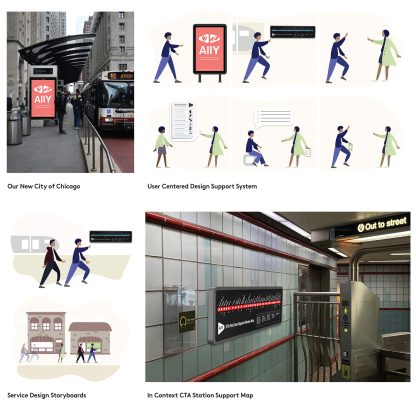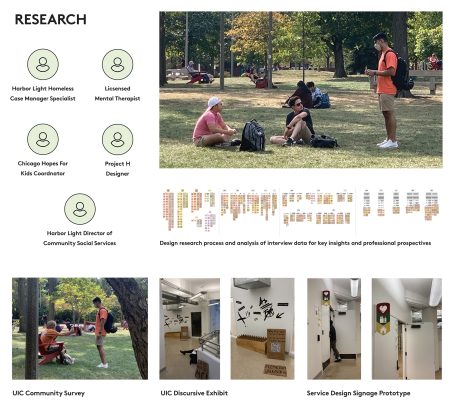UIC graduate wins global design award focusing on homeless community in Chicago
A senior thesis focusing on the homeless community in Chicago by a recent University of Illinois Chicago graduate from the College of Architecture, Design and the Arts has won an award in the Global Design Graduate Show 2022 competition.

Xavier Pacheco, who graduated in May with a bachelor’s degree in industrial design from the School of Design and a minor in psychology, earned the award in the service design category.
He was one of nearly 5,500 students to enter the show, which is in its third year and is run by Arts Thread, a digital platform for emerging artists, in collaboration with the luxury brand Gucci. There were almost 400 art and design schools represented from around the world.
Pacheco’s project, “Addressing the Homeless Community of Chicago,” asks a powerful question: “In a city that takes pride in the close-knit nature of its communities, why is it that the homeless community is largely overlooked by its citizens?”
What started as an idea when he first encountered a homeless encampment near the UIC campus during his sophomore year, was developed and crafted by Pacheco for his thesis over several years of design studies.
“The senior thesis is a representation of who we are as a designer, so I wanted to use this opportunity to really address something that I personally held close to my heart,” said Pacheco, who is originally from Aurora but now lives in Chicago.
Pacheco said that as a city of 2.7 million people, Chicago’s tight-knit communities serve to provide the benefits of what the city has to offer. While the communities are developed to grow together, Pacheco asks about those who are left out.
“I wanted to ask the question, ‘Why is it we as a society inhumanly treat and do not provide the same amount of support for one particular community?” Pacheco said. “The homeless community in Chicago is a close-knit community of individuals who are constantly among us. As a society we don’t even acknowledge that these individuals exist.”
He said he was disturbed by how it has become a social norm to ignore the homeless as they try to interact and ask for anything that would help them. Society instead allows itself to be fueled by the misconception that the homeless are somehow responsible for their plight, due to substance abuse or laziness, Pacheco said.

His project fills the need for public service messaging that targets the homeless to assist them in finding the help they need, he said. In response, he created “AllY” a user-centered support system designed for Chicago’s homeless community. The system provides information about nearby resources through infographic support maps and connects them to service locations via the Chicago Transit Authority, he said. AllY cards with information about services would also be distributed and shared among the community.
“AllY puts an ally on the streets of Chicago to assist homeless individuals in getting back to where they want to be,” Pacheco said. “I felt that we finally must address this issue and alter the stigma that infects our society’s perspectives toward the homeless community.”
He conducted community surveys on the UIC campus with students and faculty about their interactions with the homeless community. He also interviewed professionals who directly work with the homeless population to tap into their years of experience. In total, he interviewed 185 participants.
After the surveys were conducted, he used the insights he had gleaned to create the support system. He later had the opportunity to speak with an alderperson to share his proposal with the city.
After graduating from UIC, Pacheco began working with Deloitte as a design analyst within its applied design team.
“Chicago’s my home so I wanted to do something that could directly impact where I live,” he said.

